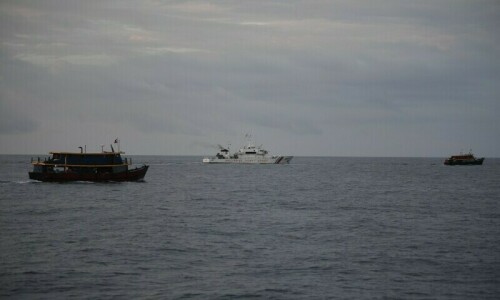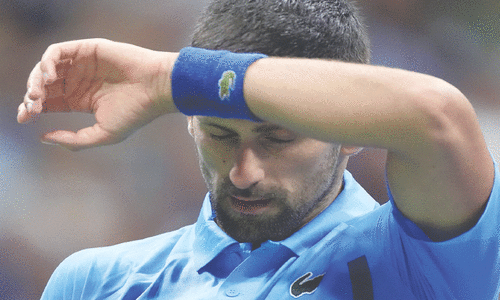As the band begins to head bang during a particularly energetic sequence in the song, there are many in the audience who swing their heads along with them, and clap to the beat. This is the power of an unadulterated live performance by a band — a power wielded so well by Pepsi Battle of the Bands (BOB).
One had almost forgotten the sheer rush of adrenaline experienced during a riveting live performance, of singing and screaming along to the undulating pitch of a vocalist at a rock concert. The credit goes to BOB for helping spur the return of band and concert culture to Pakistan.
The star power and know-how of the show’s judges is a plus: Fawad Khan, Meesha Shafi, Shahi Hasan and Strings’ Bilal Maqsood and Faisal Kapadia make interesting, constructive observations as they sift through the performances and shortlist contenders. But for music aficionados, the raw talent of the bands unearthed during BOB is the show’s main USP.
Only three years ago, before BOB was revived and brought back into the spotlight, there were only a handful of recognisable names in Pakistan’s musical landscape, and many of them had been around for a few decades. But with BOB, newer, younger names have surfaced, and the demand for live concerts seems to have risen proportionately. Food festivals usually feature live music in the evening and standalone concerts are now taking place with greater regularity all over the country. To quote from BOB’s tagline, the ‘bands are back’, certainly.
As it revamps its look and format in its fourth season, Pepsi Battle of the Bands claims to have revived music band culture. But there are grumblings from some bands that it hasn’t done nearly enough to fulfil the commitments it made to them
But are they back for good? As I roam the set of the show, Faisal Kapadia, sitting on the judge’s podium, waiting for shooting to begin, points out to me that “BOB is a popular, well-recognised platform and bands are naturally gravitating towards it. The show is helping bring back band culture, but this can only be a slow process because these are tough times economically. There are several members in a band and survival is only possible if the band is able to sustain all of its members. It’s difficult, but at least BOB is encouraging young bands hoping to make it big.”

Aarish, one of the bands that I meet while visiting the sets, tells me that they had been flying down from Islamabad for the past three years, vying to get selected. “We never gave up every time that we were rejected. We just got more and more determined to keep trying.”
BOB seems to be trying too, to keep the show interesting. The glow-in-the-dark blue stage, where battle lines are drawn, is exciting, but it’s been around for some seasons now and according to the show’s producers, Saad Bin Mujeeb and Noor ul Huda Daudpota, they are now dabbling with changes in the format. “The first few seasons were all about establishing the format but now we are adding new elements,” they explain. “This time, we are going to be pitting two bands against each other in a series of battles. The final selection is of 12 bands and the judges will decide which bands should perform against each other in six different battles.”
It sounds like it’s going to be an energetic show, sure to create hype for its young participants. And ultimately, the mileage is BOB’s greatest service extended to bands that are just starting out. Bilal Ahmed of Kashmir, the winning band back in 2017, observes, “We had been playing the same songs since 2012, and no one had taken notice of them. They only became massively popular once audiences heard them on the BOB stage. There is no other platform that allows young musicians to showcase their skills like this.”
But not all BOB winners are as enthusiastic with their praise. Winners and runners-up are given cash prizes and promised career boosts such as their own videos, concert tours, an album produced by the main sponsor, and royalties on their songs. Apparently, once the show ends, BOB’s organisers aren’t very prompt with fulfilling some of their promises. For instance, last year’s runners-up Xarb and Badnaam, runners-up from two years ago, are yet to release videos.
BOB is a popular, well-recognised platform and bands are naturally gravitating towards it. The show is helping bring back band culture, but this can only be a slow process because these are tough times economically. There are several members in a band and survival is only possible if the band is able to sustain all of its members. It’s difficult, but at least BOB is encouraging young bands hoping to make it big.” — Faisal Kapadia
Are the bands not back?

“The organisers take so long in making their decisions,” Saud Anver, the guitarist of Xarb, reveals. “They are yet to pass approval on our video. The recording of our album is in the works but, even there, every step gets delayed extensively due to late responses. Also, hardly any effort has been made to market our work.”
Badnaam has endured similar experiences. “Two of our songs are stuck with a well-known producer who refuses to give them to us because he also hasn’t been paid by the main sponsor,” says Ahmed Jilani. “Our video is yet to come out and they produced a supposed album for us, consisting of three songs. How can three songs constitute an album? We are also supposed to get royalties on our music but, to date, we haven’t been paid anything for the millions of hits that our songs have gotten on the BOB platform on YouTube.”
“Our band has been together for eight years now and we have overcome barriers, working on our music while simultaneously maintaining other jobs,” says Saud of Xarb. “We’ll continue to manage.”
But why should bands, who have proven their mettle on a high-profile stage, have to ‘manage’? Why should they have to ask after the commitments made to them by a mainstream corporate sponsor? Also, any delays in decision-making lead up to bands missing out on the mileage that would have benefitted them, had their singles and videos released shortly after their wins were announced.
“The concerts that were promised to us have been taking place,” Saud concedes. “We have performed in six concerts so far, and I think that we will be performing in four more as soon as concert season resumes.”
Concerts are, of course, a major source of revenue for musicians, and BOB’s winners have been featured in multiple concerts. “Pepsi is proud of having created a platform for young talent and investing in emerging bands,” says Frieha Altaf, who is handling the PR for BOB this time round. “The company will always abide by their commitments. Badnaam was a runner-up two years ago and their commitments have been fulfilled. Pepsi is proud to have mentored them and wishes them a great future.”
She continues, “Xarb is the runner-up band from last year and in contract with Pepsi till November 2019. The brand has been happy to project them in multiple concerts across Pakistan. They have also been invited for a special performance in Season Four. The brand looks forward to showcasing their creativity in their upcoming album and video, and will continue to work with them in the later part of this year. Delays are part and parcel of any creative process but Pepsi is happy to continue supporting the band.

“We are very excited about the new season and the freshness of the new format. The audience will enjoy it as have the bands and the jury, alike.”
There are, of course, other efforts that BOB has undeniably made. Strings has opted to guide the bands into making their own albums this time round and participants, throughout the past three years, have talked about how the judges’ guidelines have helped them.
But in order for it to stay true to its claim that it means to bring bands ‘back’, BOB needs to do more than merely announce their victories. It needs to follow up promptly upon the commitments made with the winners. The efforts the show has made are praiseworthy but now, in its fourth season, it needs to make more constructive moves. Only then will BOB be taken seriously as a game-changer, and not just get diminished to a show designed to haul in soft drink sales.
Published in Dawn, ICON, June 16th, 2019















































Dear visitor, the comments section is undergoing an overhaul and will return soon.